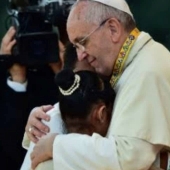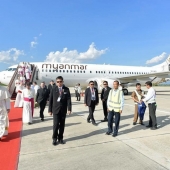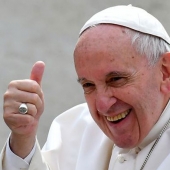Pope in the Roman Catholic Church has several names, such as: "papa", father, pontiff, successor of Peter, Bishop of Rome, head of the Catholic Church, Vicar of Christ. Therefore, in virtue of the his office, the pope has supreme, full, immediate and universal ordinary power in the Church, which he can exercise freely this power (Can. 331).
Theologically and scripturally, the Lord Jesus called Simon whom he named Peter, the "rock" in order to be the head of his Church (Matthew 16: 18-19). Jesus Christ gave Peter the keys of his Church, not only made him leader, but also made him infallible when he acted or spoke as Christ's representative on earth; this people call speaking from the seat of authority, or "ex cathedra". The purpose of the papacy is to lead the church unerringly.
Besides, like Peter, the successor of Peter, the pope also becomes the bishop of Rome and has authority over all other bishops, and he is considered as the perpetual and visible source and foundation of the unity both of bishops and the whole company of the faithful. "For the Roman Pontiff, by reason of his office as Vicar of Christ, and as pastor of the entire Church has full, supreme and universal power over the whole Church, a power which he can exercise unhindered. The college or body of bishops has no authority unless united with the Roman Pontiff, Peter's successor, as its head. As such, this college has supreme and full authority over the universal church; but this power cannot be exercised without the agreement of the Roman Pontiff" (CCC 882, 883; CAN. 332, 333). The Code of Canon Law of the Roman Catholic Church also affirms, "Just as, by the decree of the Lord, Saint Peter and the rest of the Apostles form one College, so for a like reason the Roman Pontiff, the successor of Peter, and the Bishops, the successors of the Apostles, are united together in one" (Can. 330).
As the vicar of Christ, the universal pastor, the head of the "Mother Church", the pope spends time to visit his flock, the local Churches which is called canonical visitation or pastoral visitation. It is the act of an ecclesiastical superior to visit, support, encourage, strengthen, and maintain the faith and discipline from the faithful in several places of the whole world.








